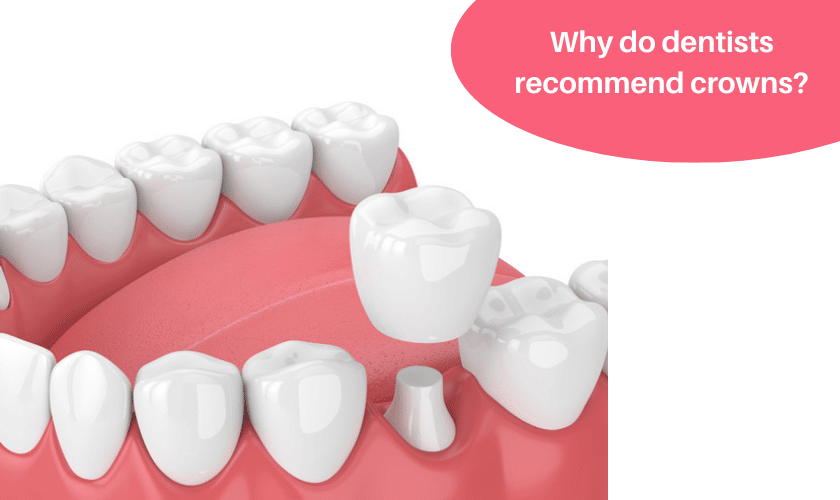Dental crowns are a popular and reliable treatment option for restoring the appearance and strength of damaged or decayed teeth. Dental crowns can be used to protect weak teeth from further damage, hold dental bridges in place, cover dental implants, and prevent cracked teeth from worsening. They can also be used for purely cosmetic reasons such as changing the colour or shape of your tooth. Dental crowns provide an effective way to improve the health and esthetics of a smile without compromising on comfort or durability.
Why Dental Crowns are Recommended by Dentists
Dental Damage or Decay
When a tooth has been damaged due to decay, trauma, or wear and tear, in some cases it can be repaired with only a filling. However if the damage is more extensive, and there is not enough healthy tooth structure left to hold a filling in place, then a crown may be recommended instead. A dental crown functions as an artificial “cap” that covers the entire visible portion of the tooth above the gum line. This provides extra strength and protection for the weakened area. Dental crowns also provide support to teeth with large fillings that could otherwise become weaker over time and eventually break.
Dental Restoration
Dental crowns are a common treatment for restoring teeth that have been damaged due to decay or trauma. Dental crowns can be used to replace large fillings, protect weak teeth from further damage, hold dental bridges in place, cover implants, and prevent cracked teeth from worsening. Dental crowns also provide an effective solution for those who want to change the colour or shape of their tooth without compromising on comfort or durability. Dental crowns are usually made out of porcelain or metal alloys and are designed to match the natural shade and contour of your existing teeth.
What is Involved with Getting Dental Crowns?
Dental Examination and Preparation
Before dental crowns are placed, dentists will typically conduct a thorough examination of the affected tooth. This may involve x-rays to check for decay or other problems beneath the surface. The dentist may also use a drill to prepare the tooth for the crown by removing any decay and shaping it into an appropriate form.
Dental Impressions
Once the tooth is prepared, your dentist will take an impression of your teeth and gums so that the dental lab can make a perfect fit for your custom crown. It usually takes about two weeks for the finished product to arrive at your dentist’s office, so you may need to wear a temporary crown in the meantime.
Dental Crown Placement
Once your permanent dental crown is ready, your dentist will place it over the affected tooth and check for fit and proper placement. Dental cement is then used to secure the crown into place. After that, you can enjoy your restored smile with confidence!
Conclusion:
Dental crowns provide a reliable way to restore the appearance and strength of damaged or decayed teeth. They are made from strong materials such as porcelain or metal alloys and are designed to match the natural colour and shape of existing teeth. Dental crowns offer long-lasting protection against further damage and also provide a solution for those who want to change the colour or shape of their tooth.
FAQs:
Q1: What is a dental crown?
A1: A dental crown is an artificial cap which covers the visible portion of the affected tooth above the gum line. Dental crowns provide extra strength and protection for weak teeth, as well as support for large fillings that could become weaker over time and eventually break.
Q2: How are dental crowns placed?
A2: Dental crowns are first prepared by having any decay or damage removed from the affected tooth, before taking an impression so that a custom fitting can be made at a laboratory. The permanent dental crown is then secured on to the affected tooth with cement once it has been fitted, restoring the appearance and strength of affected teeth.
Q3: How long will a dental crown last?
A3: Dental crowns are designed to last for many years, but with proper care and regular dental check-ups their lifespan may be extended even further. Dental crowns can become loose or dislodged over time due to normal wear and tear, so it’s important to have them checked regularly by your dentist.

